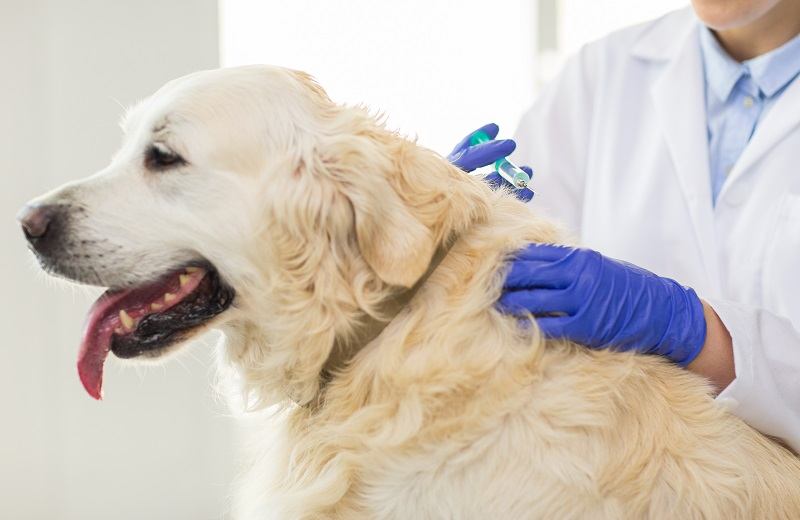Click to Skip Ahead
Autoimmune hemolytic anemia is a life-threatening condition in which a dog’s immune system starts attacking and destroying the body’s own red blood cells. As red blood cells distribute oxygen around the body, they are very important to almost every aspect of health and cellular function.
Autoimmune hemolytic anemia is often referred to as “immune-mediated hemolytic anemia”, or “IMHA”, which will be used throughout this article.
What Is Anemia?
Anemia is not a diagnosis in itself. Rather, it is a medical problem caused by a number of different diseases. Anemia is defined as a reduced number of red blood cells, hemoglobin, or both. Red blood cells are produced in bone marrow and then enter the circulation; hemoglobin is a molecule that is attached to red blood cells and is responsible for delivering oxygen to cells and tissues.

What Is Autoimmune Disease?
Autoimmune disease occurs when the immune system mistakenly identifies healthy cells as “foreign” or unhealthy. Immune-mediated diseases are very similar to autoimmune diseases, except that the specific antibody responsible for triggering the body’s immune response has not been identified.
What is Hemolytic Anemia?
Immune-mediated hemolytic anemia is a disease in which the body mistakenly attacks its own red blood cells. When enough red blood cells are destroyed, the dog develops anemia and becomes unwell due to reduced oxygen delivery to tissues. In the vet world, two different forms of IMHA are recognized.
1. Primary/idiopathic
Primary IMHA involves an abnormal immune response with no recognized “trigger”. It may also be referred to as Idiopathic IMHA, which means that the cause of the disease is unknown. The majority of dogs suffering from IMHA (up to 75%) have primary IMHA.
2. Secondary
Secondary IMHA occurs when an underlying disease has altered the surface of red blood cells, causing the dog’s immune system to identify them as “invaders”. This underlying disease can be anything from a toxin or medication to infection or cancer. Previously, even vaccinations were believed to be a trigger for secondary IMHA, but studies regarding this have failed to show a strong association.

What Are the Signs of Autoimmune Hemolytic Anemia in Dogs?
The signs of IMHA are related to anemia and reduced oxygen delivery to tissues:
- Lethargy
- Reduced appetite
- Pale or yellow-orange gums
- Labored breathing
- Dark discoloration of urine
- Vomiting/diarrhea
One product of red blood cell destruction is bilirubin. As this builds up in the blood, the gums and sclera (white part of the eye) take on a yellow/orange appearance, and as bilirubin “spills over” into the urine, the urine also becomes dark.
What Are the Causes of Autoimmune Hemolytic Anemia in Dogs?
Hemolytic anemia is an autoimmune or immune-mediated disease in which the body incorrectly attacks and destroys its own red blood cells. While in certain cases an underlying condition, such as infection or cancer, activates this abnormal immune response, the majority of cases occur for unknown reasons.

How Do I Care for a Dog with Autoimmune Hemolytic Anemia?
Since IMHA is serious and life-threatening, managing this condition starts with a visit to the vet. The vast majority of dogs with IMHA require admission to the vet hospital for further testing, supportive care, and treatment. Treatment may involve:
- Fluids via a drip to maintain perfusion and hydration
- Blood transfusions, if the red blood cell count is low enough
- Supportive medications, such as pain relief, anti-nausea, and blood-thinners
- Immune-suppressant medications to “shut down” the abnormal immune response causing red blood cell destruction.
What is the Treatment for Autoimmune Hemolytic Anemia?
The cornerstone of treating IMHA is a medication called prednisolone. This is a steroid medication that, when used at higher doses, suppresses the immune system. Prednisolone therapy is required for several months, and should never be discontinued abruptly; rather, dogs need to be slowly “weaned off” this medication while monitoring for the recurrence of any signs. It is worth noting that steroids almost always have side effects when used to treat IMHA—increased appetite and thirst, more frequent urination, weight gain, and changes to the hair coat are most common. Occasionally, if prednisolone has not proved adequate for treating a dog’s IMHA, or if the side effects are too significant, a second immune-suppressive medication will be added.
Underlying diseases, such as toxins, cancer, or infections, must also be treated if they are identified. Surgical removal of the spleen is sometimes considered.

Frequently Asked Questions
Do Dogs with Hemolytic Anemia Have This Condition Forever?
Most dogs with IMHA can be taken off the prednisolone medication after 6–12 months of treatment, with no ongoing signs. If signs of IMHA return, or if a dog’s red blood cell count begins to drop once prednisolone is discontinued, the medication will need to be restarted. A small proportion of dogs require lifelong treatment for IMHA.
What Is the Prognosis for Dogs with IMHA?
The prognosis for dogs suffering IMHA is based on the severity of the disease, and if an underlying cause has been identified. With early intervention, primary or idiopathic IMHA can generally be managed, and most dogs make a full recovery. If dogs are extremely sick, presenting in shock, or if IMHA has been triggered by an underlying disease such as cancer, the long-term outlook is poorer.

How is IMHA Diagnosed?
Generally, a combination of tests is used to diagnose IMHA. Some of these tests include:
- Packed Cell Volume to assess red blood cell numbers
- Complete Blood Count to look at white cells and other values
- Blood Smear to visualize red blood cells under a microscope
- Saline Agglutination Test to check for red blood cells “sticking together”
- Coombs Test to look for antibodies in the blood
- X-rays, ultrasound, and urine tests to check for other disease (secondary IMHA)
If the case is particularly complex, or not going well with standard treatments, your vet may refer you and your dog to an internal medicine specialist.
Conclusion
IMHA is a serious auto-immune disease that is fairly common in dogs. When the body starts attacking its own red blood cells, bad things happen—particularly anemia. This can occur surprisingly quickly and may not have an identified cause or trigger. Treatment is generally intensive, involving admission to a vet hospital, immunosuppressive medications, and sometimes a blood transfusion to restore normal red blood cell numbers in the circulation.
Thankfully, most dogs can be successfully treated, and, though relapses are common, these dogs have good quality of life. If you are concerned that your dog has IMHA, or if this condition has been diagnosed but you have more questions, don’t hesitate to contact your veterinarian.
Featured Image Credit: Ground Picture, Shutterstock











